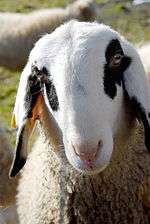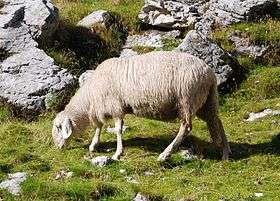Jezersko–Solčava sheep
|
Jezersko–Solčava sheep on the Dleskovec Plateau above the village of Solčava, northern Slovenia | |
| Other names | |
|---|---|
| Country of origin | Austrian Empire |
| Distribution |
|
| Use | dual-purpose, meat and wool |
| Traits | |
| Weight | Male: 75–80 kg |
| Female: 55–65 kg | |
| Height | Male: 81 cm |
| Female: 75 cm | |
| Wool color | white |
| Face color | white, black patches around the eyes |
|
Sheep Ovis aries | |
The Jezersko–Solčava sheep (German: Kärntner Brillenschaf or Seeländer Schaf, Slovene: jezersko-solčavska ovca) is a breed of domestic sheep from the regions of Jezersko and of Solčava, formerly in the Austrian Empire, now in Slovenia.[2] It is raised also in parts of Austria,[4] Germany[5] and Italy;[6] a small number were imported to Serbia in 1991.[1]
History
The Jezersko–Solčava sheep results from cross-breeding the Tiroler Steinschaf with the Italian Bergamasca and Padovana breeds.[7][8] It is raised both for meat and for its wool, of which it yields 4–5 kg per year.[7] The wool is fine and of good quality.[9]
At the end of 2013 the population reported from Slovenia was 17,200;[2] Austria reported 5112–6500,[4] Germany 727[5] and Italy 4973.[10]
Characteristics

The Jezersko–Solčava sheep has black patches around the eyes, which may give it the appearance of wearing glasses. It has a markedly convex profile and is lop-eared; the lower part – from one to two thirds – of the ears is black. The lips and chin may be flecked with black; the coat is otherwise white. Both sexes are polled (hornless). The hooves are strong.[11][12]
Ewes lamb twice a year, with a twinning rate of 70%.[7]
References
- 1 2 Breed data sheet: Jezerskosolcavska/Serbia. Domestic Animal Diversity Information System of the Food and Agriculture Organization of the United Nations. Accessed December 2013. (Note: dead link, accessible through a black-listed archiving service)
- 1 2 3 Breed data sheet: Jezersko-solčavska ovca/Slovenia. Domestic Animal Diversity Information System of the Food and Agriculture Organization of the United Nations. Accessed December 2013.
- ↑ "Jezerka". Termania.net. Retrieved 17 August 2014.
- 1 2 Breed data sheet: Kärntner Brillenschaf/Austria. Domestic Animal Diversity Information System of the Food and Agriculture Organization of the United Nations. Accessed December 2013.
- 1 2 Breed data sheet: Brillenschaf/Germany. Domestic Animal Diversity Information System of the Food and Agriculture Organization of the United Nations. Accessed December 2013.
- ↑ Breed data sheet: Villonesser Schaf/Italy [sic]. Domestic Animal Diversity Information System of the Food and Agriculture Organization of the United Nations. Accessed December 2013.
- 1 2 3 Daniele Bigi, Alessio Zanon (2008). Atlante delle razze autoctone: Bovini, equini, ovicaprini, suini allevati in Italia (in Italian). Milan: Edagricole. ISBN 9788850652594. p. 302–303.
- ↑ Brillenschaf (in German). Gesellschaft zur Erhaltung alter und gefährdeter Haustierrassen e.V. Accessed December 2013.
- ↑ Le razze ovine e caprine in Italia (in Italian). Associazione Nazionale della Pastorizia: Ufficio centrale libri genealogici e registri anagrafici razze ovine e caprine. p. 81. Accessed August 2014.
- ↑ Consistenze Provinciali della Razza O4 Villnoesser Schaf/Fiemmese Anno 2013 (in Italian). Associazione Nazionale della Pastorizia: Banca dati. Accessed August 2014.
- ↑ Norme tecniche della popolazione ovina “Villnoesser Schaf” (nome locale trentino:Fiemmese o Tingola): standard della razza (in Italian). Ministero delle Politiche Agricole, Alimentari e Forestali. Accessed August 2014.
- ↑ Christian Mendel (2008). Das Brillenschaf (in German). Gesellschaft zur Erhaltung alter und gefährdeter Haustierrassen. Accessed August 2014.
External links
 Media related to Jezersko–Solčava sheep at Wikimedia Commons
Media related to Jezersko–Solčava sheep at Wikimedia Commons
